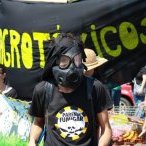English · Español

21 February 2011 | Videos | Food Sovereignty
Categorical No
GM pineapple rejected in Costa Rica
Download: MP3 (1.7 Mb)
Different Costa Rican ecologist organizations and political sectors demanded the national governments to ban GM pineapple seeds in the country. They warned that they were not even able to control conventional pineapple plantations.
Several Congress members of the opposition parties Citizens’ Action Party and Frente Amplio and members of the Green Bloc, a network of ecologist organizations of Costa Rica, held a press conference at the Legislative Assembly to ask for the rejection of the request of the company L.M.Veintiuno for the commercial production of GM pineapple. The company aims to plant 80 to 200 hectares of this crop in the south of the country.
Environmental activist Fabian Pacheco, of the Social Ecology Association, said in a press conference that “harvesting 80 to 200 hectares of GM pineapple, which impacts on health have not been studied yet, implies endangering the national biosafety”.
Pacheco added in the conference that the “department of the State’s Biotechnology, the Fitosanitary Service, have shown absolute lack of capacity to defend the Costa Rican biosafety”.
The representative of the National Front of Sectors Affected by Pineapple Production, Erlinda Quesada, said “If our authorities have not been able to mitigate or transform all the environmental and social problems caused by conventional pineapple, how can they make sure that now this is not going to happen with GM pineapple? “That is virtually impossible to us”, she said.
The ecologist organizations of the Green Bloc said in a press release that the State’s Biotechnology department is “abandoned”. It has only three employees in charge of the biosafety of the areas exceeding 800 hectares (2009-2010) harvested with GM soy and cotton”. The harvesting areas exceeded 1,700 hectares in some years.
The Green Bloc and the representatives of the Citizens’ Action Party and the Frente Amplio are asking for a “Precautionary Principle” to be applied in order to avoid the harvesting of a GM crop of which the real impacts on health and the environment are unknown. The Green Bloc says in its press release that the liberation of GM pineapple is “unacceptable” without objective studies that ensure the crop is harmless. Environmental activists and congress members signed a letter with these declarations that will be sent to several government bodies.
“Granting these permissions would be ecological suicide for Costa Rica. It would be a disaster”, said representative Jose Maria Villalta, of Frente Amplio. “We have not had the capacity to control the conventional cultivation of pineapple. There is more and more water pollution, erosion and destruction of forests. The authorities have not been able to control these damages even though they are conventional crops”.
Villalta also highlighted that “not even Europe, with its scientific, technological and economic capacity, has been able to carry out conclusive studies on the health, environmental and economic impact of GM pineapple”.
In this context, the Green Bloc, the Costa Rican Network of Biodiversity Coordination and the national section of the Pesticide Action Network and its Alternatives for Latin America (RAPAL), are working on a campaign against fumigations in the country, which is called “Stop fumigating”.
They claim that Costa Rica is the state with highest agrotoxic use in the region. A study conducted by the Regional Institute of Toxic Studies shows that the country is significantly increasing the use of these products without there being a growth in the agricultural area.







